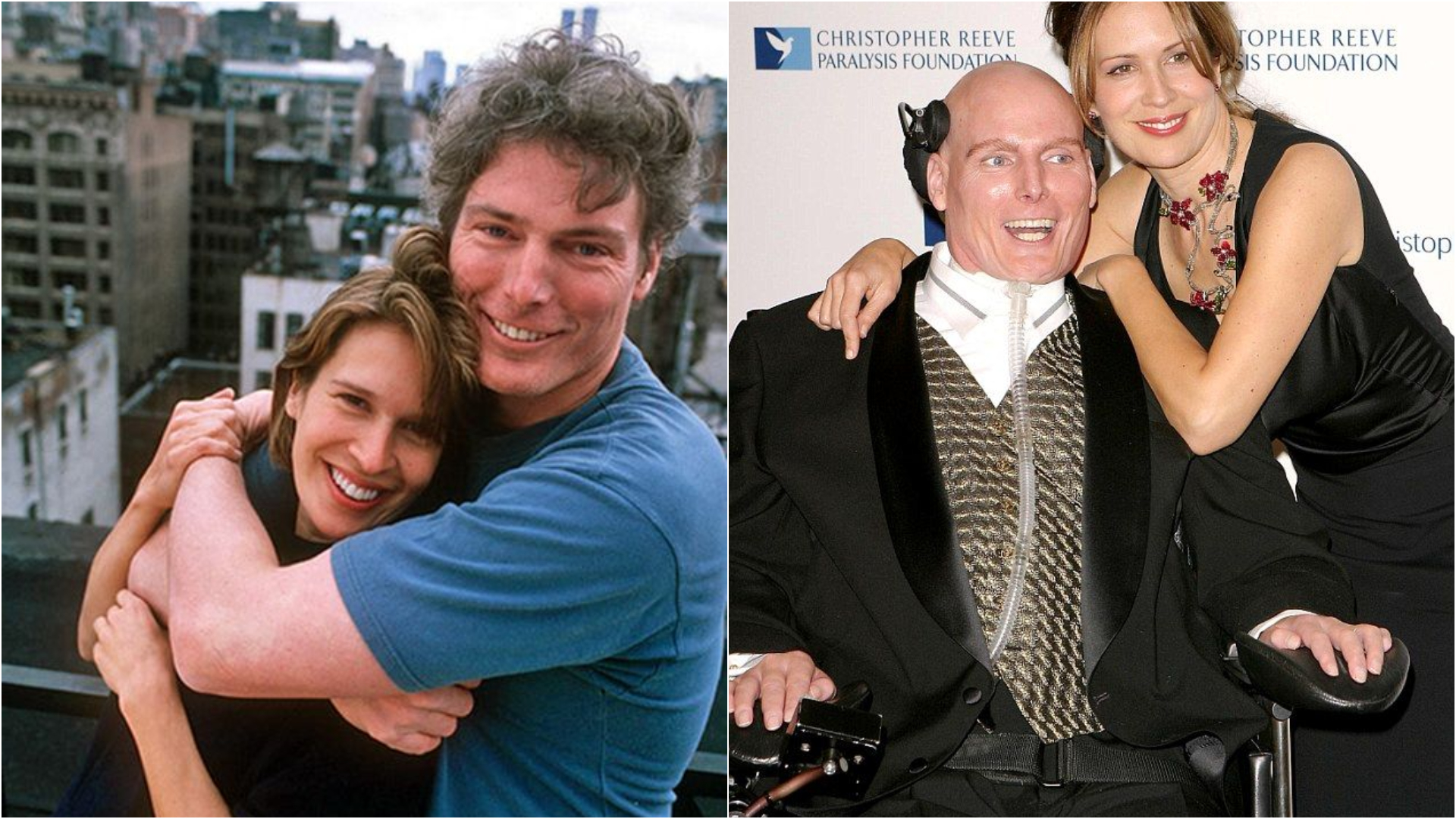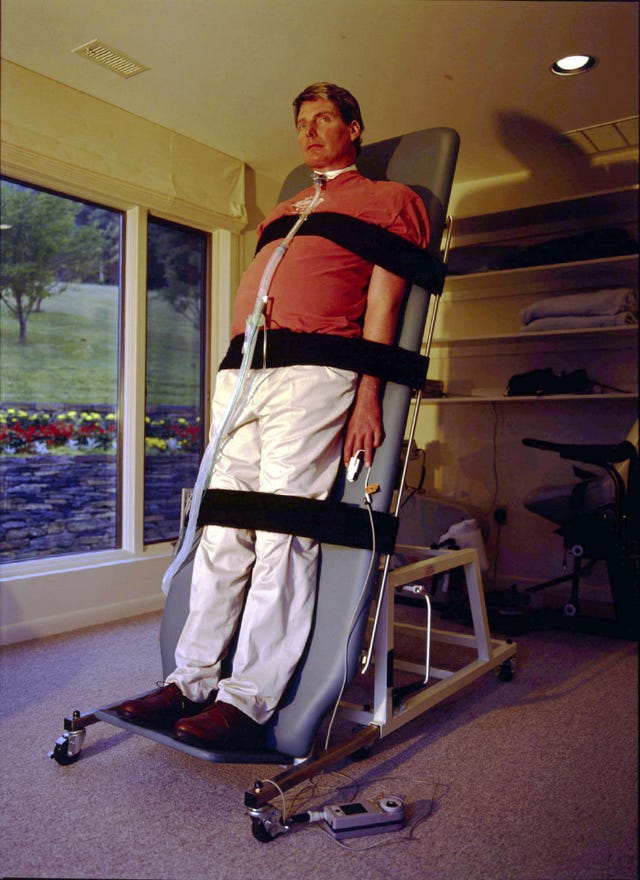Christopher Reeve's Life & Legacy: Age, Accident & More
How does a life, seemingly brimming with promise and success, transform in an instant? The story of Christopher Reeve, a Hollywood icon whose trajectory was irrevocably altered by a tragic accident, offers a poignant testament to the fragility of life and the indomitable spirit of the human will. His journey, marked by both extraordinary triumphs and devastating setbacks, continues to inspire and resonate with audiences worldwide, serving as a reminder of the power of perseverance and the importance of finding meaning in the face of adversity.
Born Christopher D'Olier Reeve on September 25, 1952, in New York City, to journalist Barbara Johnson and writer/professor F.D. Reeve, he embarked on a career that would catapult him to global fame. His portrayal of Superman in 1978, cemented his place in cinematic history, turning him into a symbol of strength, hope, and heroism for generations. Yet, it was an event far removed from the silver screen, a horseback riding accident in 1995, that would define the second act of his life and legacy, transforming him from a celebrated actor to a staunch advocate for spinal cord injury research.
| Attribute | Details |
|---|---|
| Full Name | Christopher D'Olier Reeve |
| Born | September 25, 1952, New York City, New York, USA |
| Died | October 10, 2004 (age 52), Mount Kisco, New York, USA |
| Occupation | Actor, Director, Author, Activist |
| Known For | Portrayal of Superman |
| Spouse | Dana Morosini Reeve |
| Children | Matthew Reeve, Alexandra Reeve Givens, William Reeve |
| Notable Works | Superman (1978), Superman II (1980), Somewhere in Time (1980), Superman III (1983), Superman IV: The Quest for Peace (1987) |
| Cause of Paralysis | Horseback riding accident |
| Cause of Death | Heart attack |
| Legacy | Christopher & Dana Reeve Foundation, advocacy for spinal cord injury research |
| Reference Website | Christopher & Dana Reeve Foundation |
The equestrian competition, a seemingly routine event, would become the scene of a life-altering tragedy. Reeve, a seasoned rider, was thrown from his horse, resulting in a severe spinal cord injury that left him paralyzed from the neck down. The initial shock was profound. He himself admitted that it "dawned on me that I had ruined my life and everyone else's". The vibrant life he once knew, filled with the demands and joys of a successful acting career and the freedom of physical movement, was abruptly replaced by the challenges of immobility and dependence.
- Carlos Salinas De Gortari Net Worth 2024
- Ruks Khandagale Video
- S Rules Kannada
- Max Rulz 2024 Download
- Kodah Dash Dyrdek
The immediate aftermath of the accident was a period of intense physical and emotional adjustment. He faced not only the physical limitations imposed by his paralysis, but also the psychological toll of the drastic change to his life. The superman actor was paralyzed from the neck down following a 1995 horseback riding accident. Reeves focus eventually shifted from the career that defined him to new goals and a new quest. It was in this moment of despair, however, that Reeve's true character shone through. He navigated a 'period of shock', a necessary passage that transformed his despair into determination. The actor's resilience, his ability to adapt and overcome adversity, became a source of inspiration for millions.
Reeves physical state changed his life drastically. The accident happened when he was 42. But it was not only about his physical being. It was also about finding new ways to express himself, and continue his life. He devoted himself to advocacy for spinal cord injury research and founded the Christopher Reeve Paralysis Foundation in 1996. This organization, later merged with the American Paralysis Association to form the Christopher & Dana Reeve Foundation, became a leading force in funding research and improving the quality of life for those living with paralysis. This was a pivotal shift; he embraced the role of an activist. He used his platform, his voice, and his life experiences to bring awareness to a cause he deeply cared about.
The accident, which occurred in 1995, marked a turning point. That incident was not the end but a beginning. The superman actors life was not about flying through the skies. It was about what would follow. The accident became a catalyst for him to become a staunch advocate, a symbol of hope, and a source of inspiration. In his post-accident life, Reeve focused on rehabilitation and advocacy, and the search for a cure for spinal cord injuries. This became his primary goal, his new mission. In doing so, he not only sought a future for himself but a better future for everyone facing similar challenges.
Reeves post-accident life was marked by a series of achievements. He found joy and comfort in his family and friends. He eventually learned to breathe on his own, a small feat that nevertheless represented an enormous victory. He resumed acting. His leading role in Superman (1978) made him a star, but it was his post-accident life that defined his legacy. He directed films, wrote books, and used his voice to champion the cause of spinal cord research. His ability to overcome obstacles and his refusal to be defined by his paralysis made him a symbol of resilience. His story demonstrated that even in the face of unimaginable challenges, hope, perseverance, and human connection could create extraordinary transformations.
The accident also highlighted the importance of the family. Reeve's three children remember their father as someone who always spoke his mind. His wife, Dana Morosini Reeve, played a crucial role, providing unwavering support and care. She was, as his family and friends understood, his bedrock. His family, the accident, and his legacy are deeply interconnected. Dana took care of Reeve and the kids until her death at age 44. His family, including his children, provided emotional support and encouragement that helped him navigate the challenges of his new life.
Reeves story will forever serve as a reminder that everything you know can completely turn on a dime. The film star's life shows how rapidly everything can change. His story is not just about a famous actors journey. It is a human story about resilience, courage, and the ability to find purpose amidst adversity. The story of Christopher Reeve is one that continues to resonate. His legacy is a testament to the enduring power of the human spirit and the ability to transform personal tragedy into a force for good. His story serves as a reminder that even in the darkest of times, there is always the possibility of hope and the potential for making a difference.
After the accident, did Christopher Reeve ever walk again? The answer is no, he never regained the ability to walk. The accident left him paralyzed from the neck down. Despite his physical limitations, Reeve remained active and continued to work and advocate. He used a wheelchair for mobility. He went through a period of shock. Eventually, he rose to the challenge, finding comfort and joy in his family and friends and hope in his quest for a cure. His post-accident life was a testament to his strength of character and the value of perseverance.
Reeve's impact extended far beyond his acting career. He was a vocal advocate for spinal cord injury research and a champion for disability rights. The foundation he created has significantly contributed to advancements in the field, funding research that has improved the lives of countless individuals. Reeves advocacy was not just about fundraising and awareness; it was about inspiring others to believe in the possibility of change and to fight for a better future. He devoted his life to advocacy and research after being paralyzed from the chest down as a result of a fall from a horse. His efforts led to significant progress in medical research and treatments for spinal cord injuries.
Reeve died on October 10, 2004, at the age of 52, after suffering a heart attack. His passing was a profound loss for his family, friends, and the countless individuals he inspired. His legacy, however, continues to thrive. The Christopher & Dana Reeve Foundation continues to work towards his vision of a world without paralysis. His story remains an enduring reminder of the capacity of the human spirit to overcome adversity. His life, though marked by profound tragedy, ultimately became a powerful testament to the power of hope, perseverance, and the enduring impact one individual can have on the world.
Article Recommendations
- Lara Rose Birch Telegram
- Sotwe Viral
- Www Kannada Rulz Com 2024 Download
- Action S
- Charlie Sheen S Net Worth



Detail Author:
- Name : Braxton Erdman
- Username : roderick82
- Email : davon.sauer@hotmail.com
- Birthdate : 2005-06-29
- Address : 19883 Eulalia Mountains Suite 023 Reynabury, MS 02185-3109
- Phone : +1-762-754-3758
- Company : Ankunding Inc
- Job : Electric Meter Installer
- Bio : Et laudantium placeat consequatur. Corrupti impedit vel quisquam molestias voluptas sint sed. Nulla corrupti facilis ullam. Quas nihil porro quia odio et eum et.
Socials
linkedin:
- url : https://linkedin.com/in/sallieemard
- username : sallieemard
- bio : Neque voluptatem asperiores iusto placeat.
- followers : 3596
- following : 1331
facebook:
- url : https://facebook.com/semard
- username : semard
- bio : Quisquam rerum repudiandae magni doloremque ea neque dolorum.
- followers : 2095
- following : 2100
twitter:
- url : https://twitter.com/semard
- username : semard
- bio : Quos deserunt fugit a nostrum qui id omnis et. Est deleniti saepe mollitia quia autem. Sequi aut fugit et rem.
- followers : 6172
- following : 2347
instagram:
- url : https://instagram.com/emards
- username : emards
- bio : Natus et iste exercitationem molestiae. Ex ut quod perferendis officiis.
- followers : 4596
- following : 1239